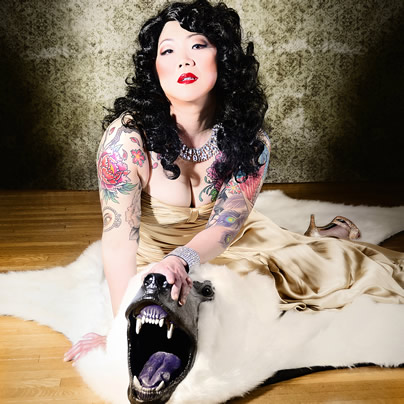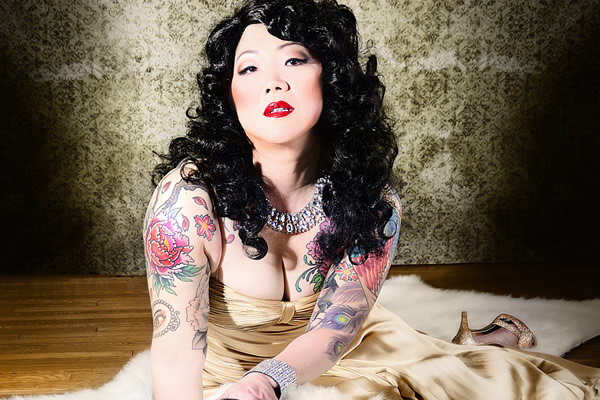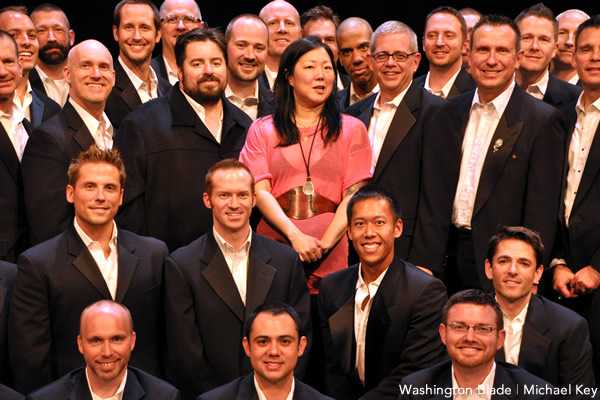Arts & Entertainment
Mother’s Day with Margaret
Cho on her new tour, hit Lifetime show and being in bed with Joan Rivers


Margaret Cho’s tour celebrates her own mother’s ‘amazing innate wisdom,’ but also the grand dame-type mantle she’s found placed upon her by the gay community. (Photo courtesy Miss Missy Photography via Ken Phillips Publicity Group)
Margaret Cho
‘Mother Tour’
Saturday
Warner Theater
1299 Pennsylvania Ave.
With Jim Short
$40.50-$69.50
8 p.m.
Margaret Cho has her hand in so many different ventures, she makes Ryan Seacrest look like a lazy slob.
Her hit show “Drop Dead Diva” is in the midst of its fifth season and airs Sunday nights at 9 p.m. on Lifetime. It just got picked for a sixth. “In Transition,” a YouTube series about three women fresh out of jail, ran until mid-September. She teamed with comedian Jim Short for a new podcast show called “Monsters of Talk” and she was just on “The Talk,” “The Arsenio Hall Show,” “E!’s Fashion Police with Joan Rivers,” Hallmark Channel’s “Home & Family” and “Chelsea Lately.”
Look for her on “The Late Late Show” with Craig Ferguson on Nov. 19. And on Saturday night, she brings her “Mother Tour,” which kicked off in Georgia in August, to the Warner Theater.
We caught up with Cho, a long-time LGBT advocate and bi herself, a few weeks ago by phone. Her comments have been slightly edited for length.
WASHINGTON BLADE: Congratulations on the success with “Drop Dead Diva.” You must be delighted it’s doing so well.
MARGARET CHO: Yes, I am. You’re always expecting that anything could happen and it’s also very rare to have a show that lasts that long. Very few shows I’ve done have ever really gone more than one season so it’s a very — well, you get more used to things getting canceled than picked up. You just always prepare for the worst. The last thing we had heard (at the end of the fourth season) was that we had been cancelled, but then it got picked up again which was interesting. I’d never seen that happen before.
BLADE: Where is it shot?
CHO: In Atlanta. But not even in the city itself. It’s about an hour south in a little town called Peachtree City.
BLADE: Do you live in L.A.?
CHO: Yes, but in Atlanta when we’re filming. I’m also on the road all the time.
BLADE: How does it feel politically in the South?
CHO: Atlanta itself is incredibly queer-friendly and progressive. We have great restaurants and great chefs and mixologists, so it’s very sophisticated and a really gorgeous place to live and hang out but then you go, like, one mile outside the city and it’s so country and so conservative you can’t believe it. I drive by a sign all the time that says “actors and models for Christ.” Peachtree City is like southern headquarters for the tea party, which they’re very proud of. There’s a little gay bar near where we work. We called them and asked if that was the gay bar and they were like, “Oh no, certainly not,” but it’s where the local gay people have agreed to hang out. They were offended when I even called and asked if it was true. But the real gay bar is the Home Depot by our set. They have aisles there that are specifically for cruising. That’s just stuff I’ve heard. People adapt to the environment.

Margaret Cho with the Gay Men’s Chorus of Washington in 2010. (Washington Blade file photo by Michael Key)
BLADE: You’ve always been very progressive and outspoken. Does it make you crazy to be in that kind of environment?
CHO: I don’t really care as long as it doesn’t infringe on my life. When they’re trying to do things like ban gay marriage or trying to keep gay couples from adopting, when they’re trying to control what happens in our families, that’s when it becomes disturbing. I don’t have issues with anybody’s religion or thoughts about whatever as long as they’re not attacking other people, gay people. Also, I want some explanation. There’s another sign out here that just says “Jesus” in huge letters. No URL, no nothing else. I’m thinking, “OK, I’m supposed to look at this and think what exactly?” I mean, I know who Jesus is. I know it’s a name. But it’s just this thing, this sign.
BLADE: You’ve been on “The View” several times. Was it ever hard to keep your cool? Did you ever get into it with Elisabeth Hasselbeck?
CHO: No, she’s a really nice person. We’re all very opinionated on there and we all have our own ideas. We don’t necessarily agree, but that’s OK. It’s OK to agree to disagree. I don’t feel I have to try to control other people’s beliefs.
BLADE: I loved your episode of “In Bed With Joan” (Rivers). It’s obvious you have a good rapport with her. What’s she like when the camera’s not rolling?
CHO: She’s so sweet and so generous and actually really loving. I mean really wise. And just full of amazing stories. She was telling me recently about meeting Laurence Olivier and he had been doing impressions of Danny Kaye. They just had these wonderful moments and you can tell she has just been this amazing fag hag for forever with this true-life fag hag history that really needs to be preserved. I mean imagine being a fag hag like her back in the day when she was doing her Elizabeth Taylor shit. It was just so profound and cool.
BLADE: But is she “on” all the time like she is in her stage or on-camera persona?
CHO: She’s actually really gentle, which is kind of surprising when you think about her stage persona. But she’s actually more like a soft-spoken, gentle person — this almost shy kind of woman. But she’s really loving, really a mom and really just hilarious. I think she’s really special.
BLADE: Your tour is called “Mother.” Tell us a little about it.
CHO: I’ve just started doing it a little now. It’s really kind of about being like Joan in a way, just being that grand dame fag hag where now people call me mother. Like being some sort of mother superior. You get to a point where you sort of have this grandeur of outlook, a kind of maturity. Then some of it too, is about my mother. And just about aging, about sexuality, about bisexuality, a lot of different things.
BLADE: If somebody were to follow you around from city to city, how much does your act change from night to night? It looks so off the cuff, but obviously it can’t really be as improvisational as it seems.
CHO: I think it’s probably a pretty totally different thing. You never know where the audience will lead you. You have to be really adept at tuning into the audience and it gets really personalized. You do it all over the world, so you get a sense of the place and each show becomes really specifically about each different city.
BLADE: How do you read an audience?
CHO: I ask specific questions and some of it depends on what I’m feeling or what’s going on in the news or what I feel needs to be talked about. There are a lot of different ways to do that. And then you just build up a conversation and that leads you into other things. There are some jokes that may be there consistently but they change in a way. You’re personalizing it to them.
BLADE: So many female comedians from you and Kathy Griffin to Joan and even back to Phyllis Diller seem to have these strong gay male audiences. Why is that?
CHO: I’ve just always been in with the gay community. I grew up with it. I just always had a real strong sense of family within the gay community. I think what it is in general is just the attraction to these strong female archetypes. Like with Kathy and Joan, it’s like gay men are looking for mother figures in a way whether it’s almost like vintage, like with Joan Crawford, or something tragic, like Judy Garland, or just somebody really strong like Madonna or really young like Gaga. I think it’s really a great thing. Joan (Rivers) I think is seen as more of a mom type. Kathy and I not as much, but maybe another kind of strong figure. It’s great and really satisfying.
BLADE: Where were you when you heard about the DOMA repeal?
CHO: I think I must have been in Atlanta. I remember thinking it was hard to imagine what that would look like in a state like Georgia, in some of these places that are so conservative.
BLADE: How did you feel?
CHO: I was really excited. It had been a very long time coming. It’s something we’ve worked for for such a long time. It’s so great to see that you can actually effect change. That’s really gratifying. I was able years ago to perform weddings at City Hall in San Francisco. I think I’ll be doing that again, which is really awesome, really satisfying.
BLADE: You have so much going on. Do you get overwhelmed by it or just want to stay home sometimes?
CHO: A lot of my work is also tied up in my social life so it’s kind of not really work. It’s also play too. A lot of it allows me to see people I love and hang out with them and talk about whatever, whether it’s Joan or Kathy or any of these people I just adore. It’s just a great opportunity — you forget that you’re working.
BLADE: But don’t you feel pressure? Working non-stop in the entertainment industry seems like it would feel like swimming in a shark tank or something.
CHO: I guess, but I have pressure in other ways. In the standup world, I feel really comfortable. It’s something other people might find really scary, but it’s something I know I can do. It’s just part of my nature. It’s not nearly as much pressure as trying not to be so self conscious for the camera or on a photo shoot or something where I kind of just get so embarrassed at trying to put on my sexy face, which just feels so stupid. I get really self-conscious in the more visual representation stuff. But standup is the one place where it’s very effortless. It’s very calming.
BLADE: I remember this photo of Bob Hope once in Vanity Fair and he was showing his joke library, which looked like a huge card catalog system with rows and rows. Do you have any system for keeping track of your own material?
CHO: I don’t have anything physical where I’ve written anything out. I’ve made a bunch of standup comedy films so all the material is there in the films but I don’t have anything written down. That would be great — I would love to be that organized, but I have a pretty good handle on the stuff I’ve done.
BLADE: Like Gwen? That became a running gag with some friends of mine.
CHO: Oh yes. Yeah, with Gwen, I just remember being so upset and the procedure itself being actually physically quite painful and it just seemed so funny to me that this woman felt the need to introduce herself to me and tell me she was there to wash my vagina in this very matter-of-fact way. That’s just what she does. So I kind of laughed and calmed myself in the moment.
BLADE: It’s quite shocking sometimes how much you manage to get away with. With a society that can really rake somebody across the coals for going over the line — I’m thinking of the Don Imus incident a few years ago — do you ever fear you’ll go too far and really piss off the world or have people turn on you?
CHO: The thing with comedy is there’s always the possibility that something like that could happen and you never really know what people are going to find offensive so you want to ride that line of being really funny but that also runs the risk of — well, you want it to go far, but not too far and where that point is, you don’t always really know. I guess whatever happens I can handle. I just try to push it as far as I can and I think you get a little immunity if you’re a woman or a person of color and queer and a gay activist and a feminist. If you’re a civil rights person and people know that, you can get away with not always being so politically correct all the time. You can kind of play the race card, or the gender card as a kind of get-out-of-jail-type thing. But you can’t rely on that too much either. Yeah, it’s a very difficult position. I just try to do my best.
Books
Love or fear flying you’ll devour ‘Why Fly’
New book chronicles a lifetime obsession with aircraft

‘Why Fly’
By Caroline Paul
c. 2026, Bloomsbury
$27.99/256 pages
Tray table folded up.
Check. Your seat is in the upright position, the airflow above your head is just the way you like it, and you’re ready to go. The flight crew is making final preparations. The lights are off and the plane is backing up. All you need now is “Why Fly” by Caroline Paul, and buckle up.

When she was very young, Paul was “obsessed” with tales of adventure, devouring accounts written by men of their derring-do. The only female adventure-seeker she knew about then was Amelia Earhart; later, she learned of other adventuresome women, including aviatrix Bessie Coleman, and Paul was transfixed.
Time passed; Paul grew up to create a life of adventure all her own.
Then, the year her marriage started to fracture, she switched her obsession from general exploits to flight.
Specifically, Paul loves experimental aircraft, some of which, like her “trike,” can be made from a kit at home. Others, like Woodstock, her beloved yellow gyrocopter, are major purchases that operate under different FAA rules. All flying has rules, she says, even if it seems like it should be as freewheeling as the birds it mimics.
She loves the pre-flight checklist, which is pure anticipation as well as a series of safety measures; if only a relationship had the same ritual. Paul loves her hangar, as a place of comfort and for flight in all senses of the word. She enjoys thinking about historic tales of flying, going back before the Wright Brothers, and including a man who went aloft on a lawn chair via helium-filled weather balloons.
The mere idea that she can fly any time is like a gift to Paul.
She knows a lot of people are terrified of flying, but it’s near totally safe: generally, there’s a one in almost 14 million chance of perishing in a commercial airline disaster – although, to Paul’s embarrassment and her dismay, it’s possible that both the smallest planes and the grandest loves might crash.
If you’re a fan of flying, you know what to do here. If you fear it, pry your fingernails off the armrests, take a deep breath, and head to the shelves. “Why Fly” might help you change your mind.
It’s not just that author Caroline Paul enjoys being airborne, and she tells you. It’s not that she’s honest in her explanations of being in love and being aloft. It’s the meditative aura you’ll get as you’re reading this book that makes it so appealing, despite the sometimes technical information that may flummox you between the Zen-ness. It’s not overwhelming; it mixes well with the history Paul includes, biographies, the science, heartbreak, and exciting tales of adventure and risk, but it’s there. Readers and romantics who love the outdoors, can’t resist a good mountain, and crave activity won’t mind it, though, not at all.
If you own a plane – or want to – you’ll want this book, too. It’s a great waiting-at-the-airport tale, or a tuck-in-your-suitcase-for-later read. Find “Why Fly” and you’ll see that it’s an upright kind of book.
The Blade may receive commissions from qualifying purchases made via this post.
Theater
Out actor Kevin Cahoon on starring role in ‘Chez Joey’
Arena production adapted from Broadway classic ‘Pal Joey’

‘Chez Joey’
Through March 15
Arena Stage
1101 Sixth St., S.W.
Tickets start at $93
Arenastage.org
As Melvin Snyder in the new musical “Chez Joey,” out actor Kevin Cahoon plays a showbiz society columnist who goes by the name Mrs. Knickerbocker. He functions as a sort of liaison between café society and Chicago’s Black jazz scene circa 1940s. It’s a fun part replete with varied insights, music, and dance.
“Chez Joey” is adapted from the Broadway classic “Pal Joey” by Richard Rodgers and Lorenz Hart. It’s inspired by John O’Hara’s stories based on the exploits of a small-time nightclub singer published in The New Yorker.
A warm and humorous man, Cahoon loves his work. At just six, he began his career as a rodeo clown in Houston. He won the Star Search teen division at 13 singing songs like “Some People” from “Gypsy.” He studied theater at New York University and soon after graduating set to work playing sidekicks and comedic roles.
Over the years, Cahoon has played numerous queer parts in stage productions including “Hedwig and the Angry Inch,” “La Cage aux Folles,” “Rocky Horror” as well as Peanut in “Shucked,” and George the keyboardist in “The Wedding Singer,” “a sort of unicorn of its time,” says Cahoon.
Co-directed by Tony Goldwyn and the great Savion Glover, “Chez Joey” is a terrific and fun show filled with loads of talent. Its relevant new book is by Richard Lagravenese.
On a recent Monday off from work, Cahoon shared some thoughts on past and current happenings.
WASHINGTON BLADE: Is there a through line from Kevin, the six-year-old rodeo clown, to who we see now at Arena Stage?
KEVIN CAHOON: Anytime I want to land a joke in a theater piece it goes back to that rodeo clown. It doesn’t matter if it’s Arena’s intimate Kreeger Theatre or the big rodeo at the huge Houston Astrodome.
I was in the middle stadium and there was an announcer — a scene partner really. And we were doing a back and forth in hopes of getting laughs. At that young age I was trying to understand what it takes to get laughs. It’s all about timing. Every line.
BLADE: Originally, your part in “Chez Joey” Melvin was Melba who sings “Zip,” a clever woman reporter’s song. It was sort of a star feature, where they could just pop in a star in the run of “Pal Joey.”
CAHOON: That’s right. And in former versions it was played by Martha Plimpton and before her Elaine Stritch. For “Chez Joey,” we switched gender and storyline.
We attempted to do “Zip” up until two days before we had an audience at Arena. Unexpectedly they cut “Zip” and replaced it with a fun number called “I Like to Recognize the Tune,” a song more connected to the story.
BLADE: Wow. You must be a quick study.
CAHOON: Well, we’re working with a great band.
BLADE: You’ve played a lot of queer parts. Any thoughts on queer representation?
CAHOON: Oh yes, definitely. And I’ve been very lucky that I’ve had the chance to portray these characters and introduce them to the rest of the world. I feel honored.
After originating Edna, the hyena on Broadway in “The Lion King,” I left that to do “Hedwig and the Angry Inch” as standby for John Cameron Mitchell, doing one show a week for him.
Everyone thought I was crazy to leave the biggest musical of our time with a personal contract and getting paid more money that I’d ever made to get $400 a week at the downtown Jane Street Theatre in a dicey neighborhood.
At the time, I really felt like I was with cool kids. I guess I was. And I never regretted it.
BLADE: When you play new parts, do you create new backstories for the role?
CAHOON: Every single time! For Melvin, I suggested a line about chorus boys on Lakeshore Drive.
BLADE: What’s up next for Kevin Cahoon?
CAHOON: I’m about to do the New York Theatre Workshop Gala; I’ve been doing it for nine years in a row. It’s a huge job. I’ll also be producing the “Cats: The Jellicle Ball” opening on Broadway this spring; it’s a queer-centric uptown vogue ball with gay actor André de Shields reprising his role as “Old Deuteronomy.”
BLADE: There’s a huge amount of talent onstage in “Chez Joey.”
CAHOON: There is. I’m sharing a dressing room with Myles Frost who plays Joey. He won accolades for playing Michael Jackson on Broadway. We’ve become great friends. He’s a miracle to watch on stage. And Awa [Sal Secka], a D.C. local, is great. Every night the audience falls head over heels for her. When this show goes to New York, Awa will, no doubt, be a giant star.
BLADE: Do you think “Chez Joey” might be Broadway bound?
CAHOON: I have a good feeling it is. I’ve done shows out of town that have high hopes and pedigree, but don’t necessarily make it. “Chez Joey” is a small production, it’s funny, and audiences seem to love it.

The Capital Pride Alliance held the annual Pride Reveal event at The Schuyler at The Hamilton Hotel on Thursday, Feb. 26. The theme for this year’s Capital Pride was announced: “Exist. Resist. Have the audacity!”
(Washington Blade photos by Michael Key)











































